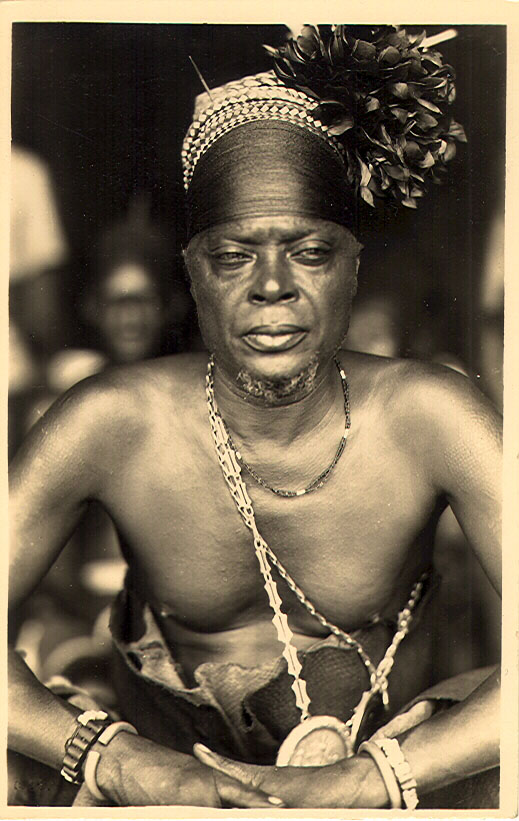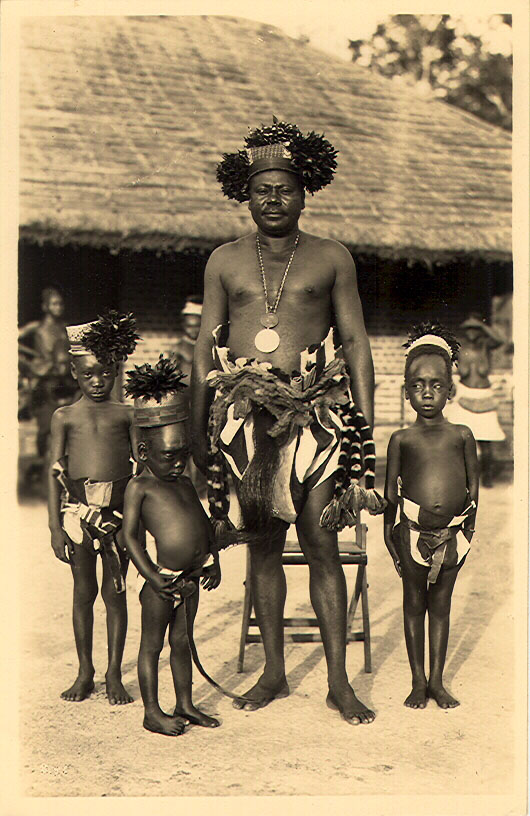Boyoma History
.jpg)
Babira Chief from Ituri

Grand Chief Mangbetu

Grand Chief Mangbetu Okodongwe
Ababua, Abandja, Abangba, Abarambo, Akare, Alur, Amadi, Azande (Niam Niam), Babali, Babira, Badjo, Bahima, Bakango, Bakumo, Balendu, Bamanga, Bambole, Bandaka, Bangandu, Bangelima, Baniari, Barumbi, Basoko, Bombesa, Fadjelu, Gombe, Kakwa, Logo, Lokeli, Lugware, Mabinza, Mabudu, Madi, Makeri, Maleli, Mangbele, Mangbetu, Mayogo, Medje, Mituku, Mobango, Mobati, Mobenge, Momvu, Mundu, Popoie, Topoke, Turumbu, Wagenia, Walengola, Walese (Balese), Wasongolo, Aka, Bambuti, Bafete, Basa, Basua, Efe
Mbuti
The Mbuti population lives in the Ituri Forest, a tropical rainforest covering about 70,000 km2 of the north/northeast portion of the Republic of Boyoma. The world of the rainforest is one of filtered sunlight under a tall, dense canopy of trees, where deep quiet is punctuated by sounds of the many birds and animals who share the forest with the Mbuti. A constant, comfortably warm temperature, plentiful rainfall, moist air, and rich soil help to nourish the multitude of plants that grow there. In turn, this richness of flora sustains a broad range of animals, birds, and insects which become a food source for the Mbuti.
The forest is the core element around which traditional Mbuti life flows. They sometimes refer to the forest as mother or father, acknowledging it as the source of their food, clothing, and materials for shelter. Mbuti reverence for the forest extends beyond being merely a source of supplies to viewing it as sacred, as a "deity" from which they ask for help and give thanks through their ritual ceremonies, including the molimo. They think of the forest as a place to return to for safety.
Although the Ituri Forest seems dense and impenetrable to outsiders, the Mbuti are at home in the rainforest and know its paths, valleys, and rivers intimately. They have great endurance and are able to orient themselves and travel long distances quickly and easily. Their skills as quiet, stealthy hunters allow great success at killing animals and birds to provide the needed protein for their diets. They also are wise gatherers of mushrooms, roots, and other vegetation, who know which items are poisonous and should be avoided. Other food sources include termites and honey, and plantains obtained through trade with Bantu villagers. They live in small groups of families, building camp sites of small, round huts from pliable saplings covered with large leaves to shed the rain. These villages are temporary, and are abandoned when the group moves on to an area with more plentiful game and vegetation. Each new Mbuti camp site is close enough to the periphery of the forest to provide relatively easy access to the particular Bantu village with whom each Mbuti group has a political and economic relationship.
Hunting occurs only when meat is needed for consumption or trade with the Bantu, and the successful hunter typically shares with others of his group. Men do the hunting, particularly when they are hunting with bow and arrow, but women and children play a key role when nets are used. Long nets are spread by the waiting hunters, and the women and children flush game into the nets. Men and women share roles as gatherers of vegetation, as well as child care. Women are in charge of building the huts and do most of the cooking.
The Mbuti are characterized as good natured and happy. Since food and firewood is so plentiful, only a small portion of their day is spent hunting or doing chores, leaving an abundance of time for singing and storytelling. They are peaceful and avoid conflict with outsiders, preferring to return to their "real" world of the forest rather than deal with unpleasant situations. Instead of having a central figure of authority, they live cooperatively and solve problems among themselves by arguing relentlessly until a compromise is reached. In extreme cases, the group may ostracize an individual, forcing them to live alone in the forest for a period of time, eventually allowing them to return to the group.
Rituals and Traditions: The Molimo
The molimo is a major ritual in Mbuti life, inspired by their belief that the forest is the center of their existence, the source of all that is good in their lives. It is celebrated to give thanks to the forest or, after a bad event such as a death, to put their lives back in orderôto find balance by becoming more "centered." The molimo mad° is intended to cure noise, or akami, and lasts from one to three or four nights. The molimo mangbo is celebrated to cure death and might last a month or more. "Molimo" refers both to the ritual and to the trumpet through which Mbuti men sing to make the animal sounds and beautiful music that are part of the ritual. The trumpet is a long, hollow tube that is sometimes made of wood, and is stored high in a tree between uses. The trumpet itself is not sacredôwhat makes the ritual sacred to the Mbuti are their beliefs in the goodness of the forest that inspire the ritual.
Earlier in the day, food and firewood are gathered from every hut in the camp, signifying unity and cooperation in invoking the molimo. In the evening, men gather around a central fire to take part in the dancing and singing; women and children must stay in their huts with the door closed. At some point in the singing and dancing, young men leave the central fire and go to the forest where the molimo is stored. They carry it back, stopping along the way to immerse it in water so that the trumpet can drink and rubbing it with leaves and dirt as a symbol of water, earth, and air.
When the youths arrive at the camp with the molimo, they circle the periphery of the camp, making sure that the kumamolimo, the singing and dancing around the central fire, is good enough to enter. When the singing is most intense, the youths enter with the trumpet, adding its sound to that of the others. One youth holds one end while another sings into the end, slowly pivoting around the central fire. Depending on how well everyone dances and sings, the trumpet might stay only a few minutes or all night. After leaving the molimo trumpet is again stored in a tree until its next use.
History and Change: Its Impact on the Mbuti
The Mbuti have lived in the Ituri Forest for many thousands of years, and it is even speculated that they might be the earliest inhabitants of Africa. The first recorded reference to "pygmies" is in the story of an expedition to the area by Egyptians around 2500 B.C., where they referred to the Mbuti as "people of the trees" characterized by singing and dancing. By the time Homer and then Aristotle wrote about them, they were thought of more in mythical terms than as real people. In subsequent years, knowledge of the Mbuti decreased to the point of referring to them as subhuman monsters or creatures flying through the treetops. It was not until the 19th century, when explorers traveling in the Congo encountered the Mbuti, that these myths were corrected.
Stanley's exploration of the region during this period resulted in Colonial exploitation, which created a ripple effect eventually felt by the Mbuti. Bantu villagers, who historically lived an agricultural lifestyle in adjoining regions, were forced from their land and migrated to the areas along the edge of the Ituri Forest. Over the years of contact, the Mbuti and the villagers have developed an unusual relationship where they are somewhat interdependent, yet fiercely guard what independence they do have. Both view the other as inferior; the villagers have assumed a position of authority and view the Mbuti as heathens from the forest, but a good source for cheap labor. And, since the villagers are afraid to enter the forest to hunt, the Mbuti are also their source for meat. In turn, the Mbuti depend on trade with the villagers for plantains and other supplies grown on village plantations. From the Mbuti point of view, they have no obligation to the villagers. Instead, they acquiesce to their wishes only if it serves their purposes. Once that need is satisfied, they disappear back into the forest, regardless of any commitment they may have agreed to. This reciprocal relationship is punctuated by frequent highs and lows, depending on the situation.
In the years following the war, political upheaval has continued to cause the Mbuti to adapt their traditional way of life. In the time of Dictator Mobutu pressure by his "Zairean" government caused some Mbuti to leave the forest and live among the villagers. The ever-growing population of villagers has enticed some Mbuti to over-hunt in the forest to meet the villager's need for protein, leading to depletion of the once-rich animal population. And large areas of the forest are also being opened by gold seekers.
| CHARTER OF THE FFSA | Berlin Conference of 1884-1885 to Divide Africa | |
| Boyoma History | Boyoma Gold Mining |
|
FFSAFederation of the Free States of Africa
Contact
Secretary General
Mangovo Ngoyo
Email: [email protected]
www.africafederation.net